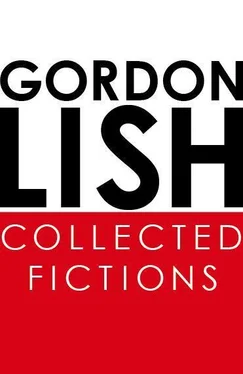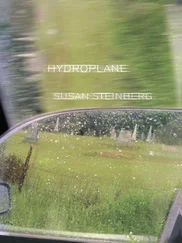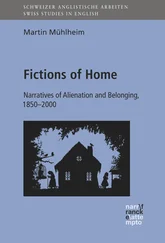So for what it's worth, that, that's the whole story, and notice, won't you, who just told it cold-sober?
HISTORY, OR, THE FOUR PICTURES OF VLUDKA
HE SAID THAT HE HAD BEEN CONSIDERING the convention of the Polish girl, and I said, "In literature — you mean in literature," and he said, "Yes, of course," how else would he mean? touching eyeglasses, beard, lip while noting that he was feeling himself compelled to take up the pose of the poet in eucharistic recollection of etc., etc., etc. — as literary necessity, that is.
He said, "So can you help, do you think?"
I said, "From memory, you mean."
"That's it," he said. "Any Polish girl you ever had yourself any sort of a thing with."
I can tell you what the trouble with me was — no beard anywhere on me, no eyeglasses either, meat of real consequence to neither of my lips — nothing, at least, to speak of, not enough to give me a good grab of anything, nothing on my face for anyone to hang onto, too little to offer a good grip of me to even myself.
He said, "Whatever comes to mind, I think."
Here was the thing with me — I did not know what to do with my hands.
"Whatever pops into your head," he said, off and at it again, fingering eyeglasses, beard, lip.
The lout was all feelies, I tell you — the lummox was ledges from stem to stern.
"So," he said, "anything you might want to conjure up for me, then? I mean, just the barest sketching, of course, no need for names and, as it were, addresses."
BUT I HAD NEVER HAD ONE. I mean, I hadn't had a Polish girl. What I had had back before this inquiry had come to me was a great wanting to pass myself off as a fellow who had had whatever could any how be got.
"Vludka," I said, "her name was Vludka."
"Wonderful," he said. He said, "Name's actually Vludka, you say."
"Yes," I said, "and very, for that matter, like it, too."
"I see her," he said. "Stolid Vludka."
"In the extreme," I said. "In manner and in form."
"Yes, the nakedness," he said. "A certain massiveness, I imagine — wide at the waist, for instance, the effect of a body built up in slabs."
I said, "Vludka's, yes. And hard it was, too. Oh, she was tougher and rougher than I was, of course — morally and physically the bigger, better party."
"But smallish here," he said, showing.
I said, "Even said she was sorry about it for the way they were even before she took her clothes off, and then, when she had got them off, saw that what Vludka should have been warning me of was of how big everything else was instead."
He said, "Could tell you'd be lost inside her, awash in stolid Vludka, splinter proposing woodworking time to sawmill and lumber."
I said, "Oh, God — cabinetry, marquetry."
He said, "It was impossible."
"I said to her, ‘Vludka, this is impossible.'"
He said, "She was too Polish for you, much too Polish."
"So I said to her, ‘Do something, Vludka. Manage this for us.'"
He said, "She was pliant, compliant — Polish. You said to her, ‘You handle it, Vludka, and I'll watch,' and she did," he said, "didn't she?"
"Because she was pliant," I said. "Compliant," I said. "Polish," I said.
He said, "It took her eleven minutes."
I said, "I sort of knew it would."
He said. "That's how stolid she was."
I said, "It was endless. My arm was exhausted for her. I timed her on my watch. Even for a Polish girl, it was incredible. I tell you, she used a blunt fingertip — even, if you can believe it, a thumb."
"It was ponderous," he said. "Thunderous," he said. "You thinly watching, you meagerly urging. ‘For pity's sake — come, Vludka, come!'"
WHAT I DIDN'T TELL HIM is that what I was really watching were the four pictures of Vludka on Vludka's bedroom wall instead.
These are what they were of — of Vludka at the railing of a big wooden-looking boat, of Vludka in a toy runabout with her hands up on the wheel, of Vludka with others on a blanket in a forest, of Vludka squatting on a scooter near a road sign that when Vludka finished doing it to herself she said, "Majdanek, you know what's there? Or was?"
HE SAID, "Well?"
I said, "Well what?"
He said, "What you were thinking — the road sign — Majdanek — what was it that was there?"
I said, "You read my mind."
He said, "No. Just the standard stuff about the camps."
ALL MY LIFE I HAVE NEVER KNOWN what to do with my hands.
Except for shit like this.
THE LESSON WHICH IS SUFFICIENT UNTO THE DAY THEREOF
HAVE I NOT BEEN INSISTING it is the most instructive of stories? In fact, it is the most instructive of stories. Indeed, the great object will be to see if I can uncover the core of the instruction that is prospectively in it. I mean, in the telling, maximize the teaching — do it, and keep on doing it, from the beginning to the end.
As to what I am talking about, it concerns an apple and an apple tree, the one having fallen from the other.
Not that that is all that there is to it. I mean, there are people, there are things. But who has the patience for even the enumeration of these?
Here is the bitter truth.
You have to have the patience of a saint.
Whereas I do not even have the patience of a Lish.
But I should say of a Lishnofski, not of a Lish.
Considering.
Considering the name Lish doesn't point to where I meant to. It doesn't point to the tree I fell from.
LISTEN TO ME talk in metaphor!
Isn't it always the way? One minute, making excuses for yourself — the next minute, making life miserable for everybody else.
It's hopeless.
Let's be honest with each other, I am already exhausted from just this much of it — the story of anything, even the narrating of Gordon Lishnofski.
But there I go again, piling figuration upon figuration. For one thing, Gordon just stands for Morton — and exhaustion, for another, for boredom.
Or nobody calling or coming around to say hi, hello, aren't you swell.
GOD, YOU GET SO FED UP with speech.
Just the idea of telling anybody anything is enough to make you sick, every word weighing tons more than it did the last time you said it — or saw it — or heard it — or wrote it — or thought it. Who's got the energy? Who's got the strength? Isn't this why the apple falls off the tree — from such a heaviness from life, from what's holding it getting weak?
BUT SILENCE IS A TIRESOMENESS, TOO.
This is what my dad's was, wearying all the way. Oh, he was the wordless one, I can tell you. No one came any more wordless than my dad did. But don't think it wasn't a shout to you if you were his son.
You know what his favorite word was?
Atrocious.
Putrid and vile , he liked those ones, too.
He'd say, "These string beans are atrocious," and for the whole rest of the meal he would say not one other thing at all.
Or he would say, "These string beans are vile," or "Putrid, putrid — can you guess what I mean?"
It never occurred to me until right this minute that maybe that this was what they incontestably were. I mean, when I was there at the family table, when did I ever sample any of the vegetables? Who knows, maybe vile and so on, maybe these complaints were restrained complaints insofar as denunciations of my mother's canned vegetables might justifiably have gone.
Considering.
Considering my mother could not actually cook anything any good in the can or out of it.
It was just that I didn't care if she couldn't.
Bananas — I loved bananas — and olives and crackers — and licorice — licorice was my idea of great eats as great as eats can get.
You know how my father would eat an apple? You want to hear how my father would eat an apple? Get a bite off of it and chew it and chew it and then hold under his chin the hand that holds the apple, and spit into it, spit into the hand, spit into it nothing but the chewed-up skin.
Читать дальше











